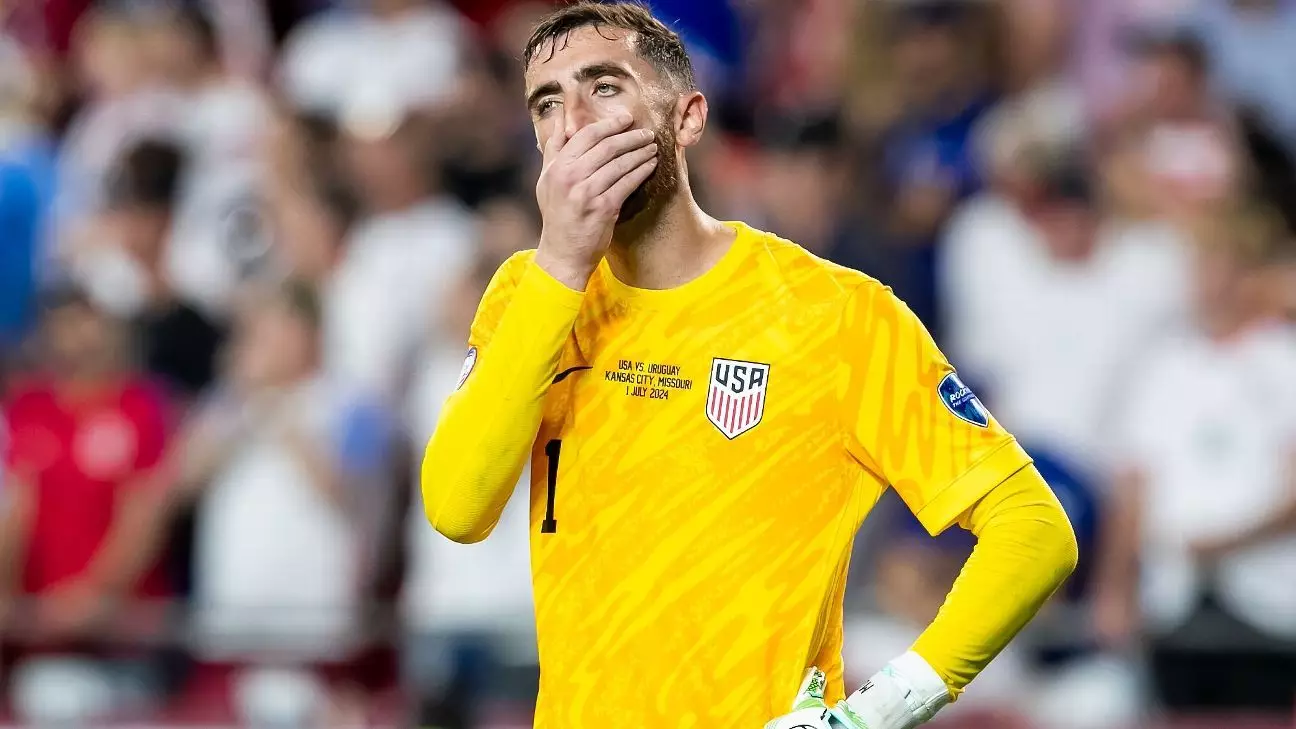For many athletes, the path to stardom is often a winding journey filled with unexpected hurdles and pivotal decisions. Matt Turner, the talented goalkeeper whose journey has been anything but linear, epitomizes this reality. With a career trajectory marked by impressive highs and challenging setbacks, his latest move back to Major League Soccer signals more than just a loan; it underscores a relentless drive for growth, stability, and national team relevance. As Turner returns to the New England Revolution, it’s an opportunity to reassess not only his career but also the broader narrative of perseverance in professional sports.
Once heralded as the future of American goalkeeping, Turner’s rise appeared meteoric when he debuted with the Revs in 2016 and quickly established himself as a reliable presence. His elevation to MLS Goalkeeper of the Year in 2021 cemented his status domestically. However, the transition to European football—signaling a desire for higher-level competition—brought unforeseen challenges. Moves to Arsenal and Nottingham Forest placed him in environments where playing time was scarce, stalling his development at critical junctures. Despite his evident talent, the lack of consistent minutes served as a stark reminder that talent alone isn’t enough; opportunity and environment matter immensely.
This latest loan deal to New England reflects both a strategic retreat and a courageous pivot. Turner, at 31, is still in the prime years of his career, yet his recent experiences have illuminated the importance of regular game exposure. The European adventure, originally viewed as the pinnacle of his ambitions, has proved to be a liminal phase—a period of introspection and resilience. Returning to the familiarity of MLS with the Revolution isn’t a step backward; it’s a calculated move rooted in the understanding that true growth requires consistent participation at the highest level possible.
Ownership Turmoil and the Unpredictability of Modern Soccer
The volatile landscape of European club ownership played a significant role in Turner’s recent challenges. His contract negotiations with Lyon, which initially seemed promising with a €9.1 million transfer fee, were marred by internal upheavals, ownership disputes, and financial instability. Lyon’s efforts to retract from the transfer amid concerns over relegation and financial constraints highlight how external factors can drastically alter a player’s career plans. Turner’s experience exemplifies the fragile ecosystem of professional soccer—where deals can be derailed by politics and economic shifts, often leaving players caught in unintended limbo.
Such instability can have lasting effects on a player’s confidence and motivation. For Turner, the tumultuous situation at Lyon and the subsequent non-official transfer underscored the importance of clarity and stability in career decisions. This series of events also serves as a wake-up call for clubs and players alike: talent alone is insufficient without the right environment that fosters consistent growth. Turner’s journey emphasizes that navigating club politics, financial considerations, and ownership disputes are now integral skills in a player’s career management.
It is worth noting that Turner’s return to MLS isn’t necessarily a retreat but rather a strategic repositioning. The league, often dismissed as merely a stepping stone, has evolved into a competitive arena where regular playing time can be the catalyst for future jumps to European giants or sustained international prominence. His familiarity with the American soccer landscape provides him a platform to rebuild confidence and reassert himself as a top keeper.
The Power of Resilience and Self-Belief in Athletic Development
Turner’s story, ultimately, is a testament to resilience. His rapid rise and subsequent setbacks exemplify how determination, self-belief, and adaptability are essential ingredients for success. The fact that he did not let adversity derail his aspirations demonstrates a level of mental toughness that many aspiring athletes lack. His willingness to return home and fight for his place, rather than accept stagnation, reflects a profound understanding that greatness is often forged in challenging circumstances.
Moreover, Turner’s journey highlights the significance of identity and regional roots. His return to the New England Revolution, his professional debut club, embodies a narrative of returning to one’s roots to reignite passion and purpose. This move could become a pivotal chapter, where he reinforces his stature both nationally and internationally, potentially leading to a fresh surge in the U.S. national team setup.
Ultimately, Turner’s career arc—marked by bold transfers, unexpected setbacks, and a steadfast pursuit of excellence—serves as an inspiring blueprint. It underscores that setbacks are not definitive but rather opportunities for recalibration. His willingness to embrace change and seek continual improvement illustrates that success isn’t just about talent; it’s about tenacity, strategic decisions, and an unwavering belief in oneself. As he steps into this new phase, Turner’s story encourages every athlete to view challenges not as deterrents but as stepping stones towards greatness.

